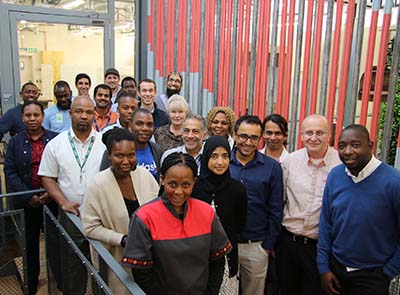The opening of IBM’s second research location in Africa – at the Wits University Tshimologong campus – marks a world first in that it is the only world-class research facility that is housed within an innovation hub.
The two organisations have also announced several new project collaborations in the areas of data driven healthcare, digital urban ecosystems and astronomy.
IBM researchers in South Africa with backgrounds in machine learning, mathematics, computer science, robotics, genomics and computational biology, are exploring the use of cognitive computing, the Internet of Things and big data to support South Africa’s national priorities, drive skills development and foster innovation-based economic growth.
“South Africa is a tremendous growth and transformation story, yet its increasing population and healthcare delivery shortfalls continue to pose challenges in the country,” says Solomon Assefa, director of IBM Research in Africa. “With the ability to detect patterns and discover new correlations, cognitive and cloud computing and the Internet of Things can provide potential solutions.”
The lab’s team of scientists is already collaborating extensively with local universities, research institutions, innovation centers, start-ups and government agencies. This will help foster South Africa’s emerging technology ecosystem and develop and scale new innovations.
As part of a 10-year investment program through South Africa’s Department of Trade and Industry and working closely with the Department of Science and Technology, the new research lab is based at the University of the Witwatersrand (Wits). *The university was recently ranked amongst the top 10 in emerging economies by the Times Higher Education World University Rankings.
Professor Zeblon Vilikazi, deputy vice-chancellor of Wits University, points out the the university aims to become more research-driven, and already 34% of its students are post-graduate.
“The launch of the IBM Research laboratory is an exciting milestone in the move towards a new era of globally competitive research, innovation and entrepreneurship that will be emerging out of the Tshimologong Precinct in Braamfontein. Wits is delighted to be collaborating with IBM. We look forward to seeing top talent congregate to address the continent’s most intractable problems and work on the world’s next game changing technologies,” says Professor Adam Habib, vice-chancellor and principal of the University of the Witwatersrand.
The lab’s focus areas include data-driven healthcare:
* In support of the World Health Organization’s End TB (Tuberculosis) Strategy, IBM scientists are designing wearable sensor technology connected to the Watson Internet of Things to trace the spread of highly infectious, communicable diseases. This innovation will help healthcare organizations and health officials develop prevention strategies and respond effectively.
* IBM scientists are developing cognitive learning approaches to transform cancer reporting, prevention and precision medicine in Africa. In a proof of concept study, IBM scientists have discovered a basic molecular link between cancer causing genes and those associated with metastasis, the cause of 90% of cancer-related deaths. Preliminary results from this work have been presented recently. Using anonymous, unstructured data provided by the National Cancer Registry in South Africa and in collaboration with the University of Witwatersrand Medical School, the team is developing cognitive algorithms to automate the inference of national cancer statistics in South Africa. This technology is expected to reduce a five-year time lag in cancer statistics reporting to realtime.
* With the support of the City of Johannesburg, IBM scientists have collected 65 samples of microbes and bacteria from 19 bus stations across the city as part of the global Metagenomics and Metadesign of the Subways and Urban Biomes (MetaSUB) international consortium. Once the samples are processed the results will be available to city planners, public health officials and scientists who will use the data to help officials predict and prepare for future disease outbreaks and discover new species and biological systems.
* In early September, scientists from IBM, H3ABioNet and the University of Notre Dame will host a hackathon on anti-malarial drug resistance and drug combination prediction.
Another area of focus is in digital urban ecosystems:
* Building on IBM’s global Green Horizons initiative, researchers at the new lab are working closely with experts from South Africa’s Council for Scientific and Industrial Research to analyse historical and realtime data from environmental monitoring stations. Using machine learning and cognitive models, the data collected in the City of Johannesburg, the City of Tshwane and the Vaal Industrial Triangle will help provide more insight about air pollution and model the effectiveness of intervention strategies. The project has recently been extended to predict ground level ozone and air quality forecasting.
* Commuters in the City of Johannesburg currently spend 35 minutes extra travel time per day due to traffic congestion, according to the Tom Tom Traffic Index. Unreliable traffic light infrastructure provides challenges to traffic light management in the city. Using real time anonymised traffic data from TomTom combined with Twitter, IBM scientists have developed a traffic optimisation recommendation tool which can help city officials dispatch traffic volunteers to the intersections where they are most urgently needed.
* The City of Cape Town often battles with devastating wild fires, due to its unique topography and vegetation. Using data from The Weather Company, an IBM business, and the City of Cape Town’s Open Data portal, IBM scientists have developed a cognitive dashboard. This can assess fire incidence risk and severity to help officials raise public awareness and prepare for emergency response.
* The number of people living off-the-grid in Africa has grown by 114 million since 2000**. To help meet the energy needs of communities who are living remotely or would like to make use of renewable energy, IBM scientists have developed a mobile app which uses analytics to determine the solar requirements of users based on their energy needs and location.
The lab will also be working with the SKA (Square Kilometre Array) in the areas of big data and analysis, training data scientists and analysing some of the data coming out of the project.
Pictured: Researchers at the IBM Research lab at Wits University’s Tshimologong precinct.

